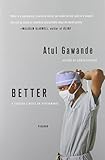Found in 2 comments on Hacker News
danso · 2012-02-09
· Original
thread
I recommend reading Atul Gawande's books:
The Checklist Manifesto http://www.amazon.com/Checklist-Manifesto-How-Things-Right/d...
Better http://www.amazon.com/Better-Surgeons-Performance-Atul-Gawan...
He's a New Yorker writer and practicing surgeon. His books contain lots of insight about ways that medicine could be vastly improved by innovation. Unfortunately, few techies are doctors.


http://www.amazon.com/dp/0312427654
note: It's a little OT, but I guess it's an interesting anecdote because it talks about how absolutely significant surgical innovation (not just, "good for the India masses") can occur in desperate situations. I have no idea if that applies to the state of the art of heart surgery in India.
------------
Among the many distressing things I saw in Nanded, one was the incredible numbers of patients with perforated ulcers. In my eight years of surgical training, I had seen only one patient with an ulcer so severe that the stomach’s acid had eroded a hole in the intestine. But Nanded is in a part of the country where people eat intensely hot chili peppers, and patients arrived almost nightly with the condition, usually in severe pain and going into shock after the hours of delay involved in traveling from their villages.
The only treatment at that point is surgical. A surgeon must take the patient to the operating room urgently, make a slash down the middle of the abdomen, wash out all the bilious and infected fluid, find the hole in the duodenum, and repair it. This is a big and traumatic operation, and often these patients were in no condition to survive it. So Motewar did a remarkable thing. He invented a new operation: a laparoscopic repair of the ulcerous perforation, using quarter-inch incisions and taking an average of forty-five minutes.
When I later told colleagues at home about the operation, they were incredulous. It did not seem possible. Motewar, however, had mulled over the ulcer problem off and on for years and became convinced he could devise a better treatment. His department was able to obtain some older laparoscopic equipment inexpensively. An assistant was made personally responsible for keeping it clean and in working order. And over time, Motewar carefully worked out his technique.
I saw him do the operation, and it was elegant and swift. He even did a randomized trial, which he presented at a conference and which revealed the operation to have fewer complications and a far more rapid recovery than the standard procedure. In that remote, dust-covered town in Maharashtra, Motewar and his colleagues had become among the most proficient ulcer surgeons in the world.